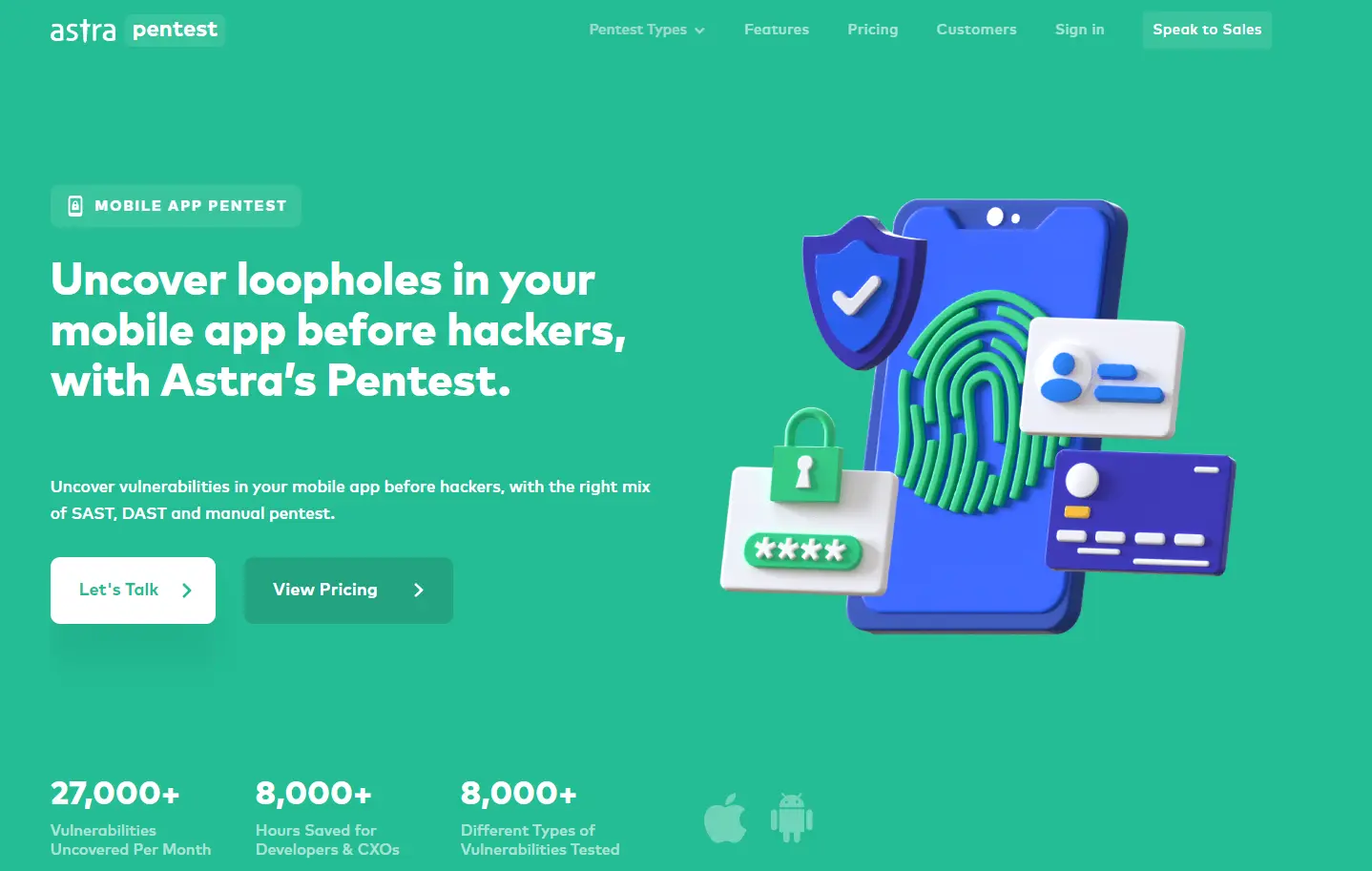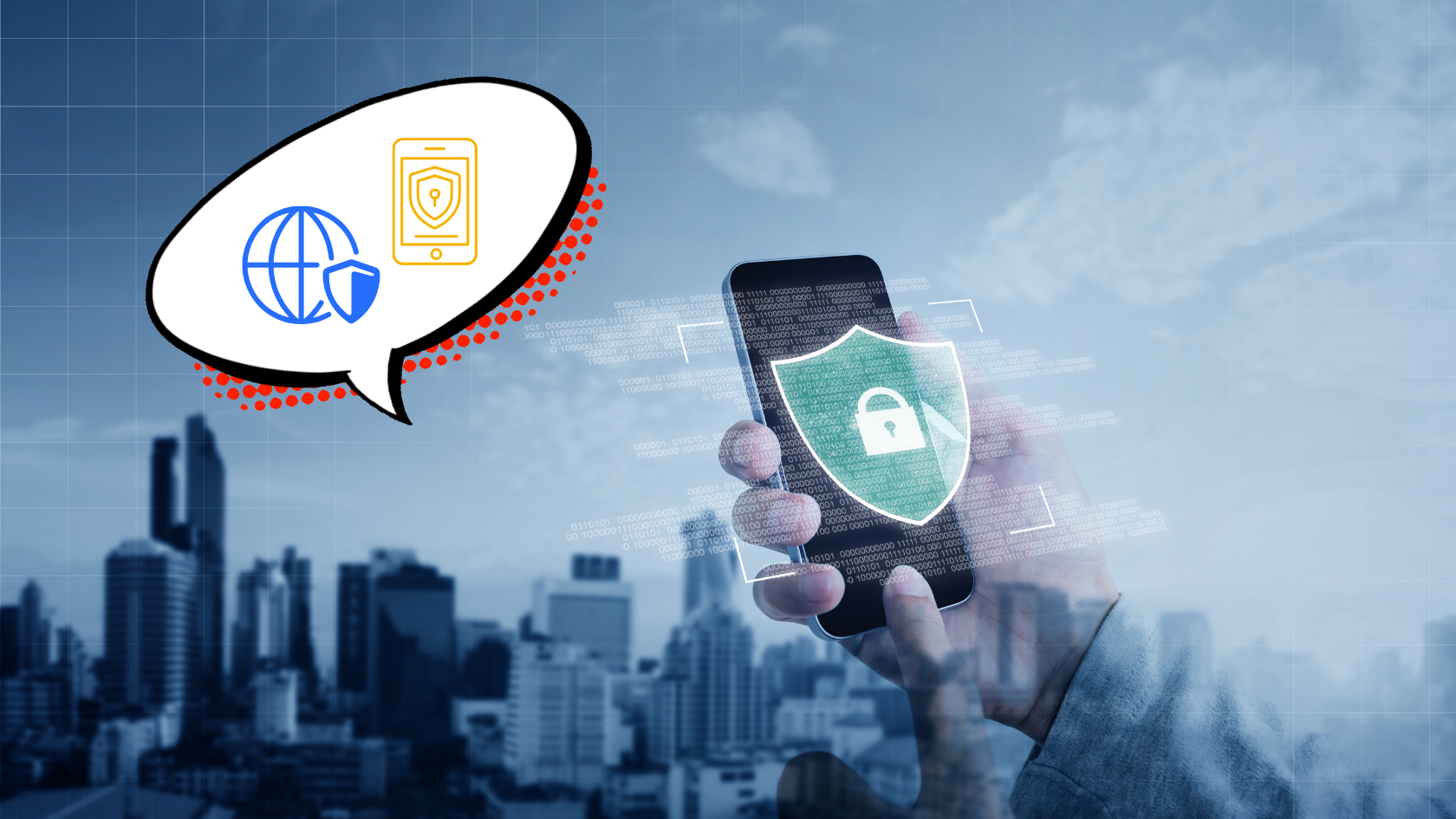Are you grappling with the question of whether iOS or Android is more secure for security-conscious users?
Here’s the drill — their sales continue to grow rapidly, with no signs of slowing down.
However, the core iOS vs Android security measures and defense mechanisms differ significantly. That too greatly. Neither of them delivers all-out protection. So it is important to consider the risks before making a choice.
Security entails protecting data from both external hackers and unauthorized domestic entities. Privacy is an essential part of this. In this article, we will do a deep dive into the following:
- What is Mobile Security?
- iOS and Android: A Brief Overview Brief introduction to iOS and Android
- The pros and cons of iOS and Android
Why is Astra Vulnerability Scanner the Best Scanner?
- Runs 8000+ tests with weekly updated scanner rules
- Scans behind the login page
- Scan results are vetted by security experts to ensure zero false positives
- Integrates with your CI/CD tools to help you establish DevSecOps
- A dynamic vulnerability management dashboard to manage, monitor, assign, and update vulnerabilities from one place.
- Helps you stay compliant with SOC2, ISO27001, PCI-DSS, HIPAA, etc.
- Integrates with Slack and Jira for better workflow management
- Trusted by the brands you trust like Agora, Spicejet, Muthoot, Dream11, etc.

The Basics of Mobile Security
What is Mobile Security?
Mobile security is essential to protect mobile devices, such as smartphones, tablets, and laptops, from threats like viruses, malware, and unauthorized data leakage.
These devices can contain critical personal and financial information which makes them a tempting target for cybercriminals.
To fight these cyber threats, Android and iOS deploy technologies to secure data transmission, applications, and intrusions. The configuration, implementation, and accessibility of these systems could differ.
Poorly secured devices face the chance of being hacked, and data extracted or encrypted for a ransom later.
iOS and Android: A Brief Overview Brief introduction to iOS and Android
iOS, created by Apple, is an operating system primarily used on iPhone and iPad devices. Built on Unix, it is renowned for its reliable performance and robust security. In the ever-growing iOS vs Android security war, iOS users have fewer customization options due to its “closed” environment, also known as the “walled garden.” All apps on an iOS device must be downloaded from the Apple App Store.
Android is an open-source OS powered by Linux Kernel. As such, it can be altered and utilized by other device manufacturers. This has been popularized by Google, and it’s often seen as a more user-friendly, customizable system, boasting the most available apps (though not all come from the official Play Store).
Popularity and usage statistics
Android dominates the global market share, with its flexibility and customization options appealing to consumers worldwide. It is present in a wide range of devices from multiple manufacturers, mostly within the low-mid-end device segment.
iOS, while having a lower overall user share, is the choice of preference among many high-end consumers, reflected in the brand’s dominance in the premium smartphone segment. While limited in customization, the robust design, and perceived device longevity make up for it in the iOS vs Android security conundrum.
Per stats, Android remains the leading mobile operating system worldwide, with 70.89% of the market share in Q4 2023. iOS accounted for 28.36% of users during the same period.
iOS Security
Pros of iOS Security
iOS is renowned for its security, owing to its closed-source code and “walled garden” approach. Some benefits that set it apart in the iOS vs Android security debate include:
- It creates a stable, secure environment, minimizes the risk of malware, and only allows vetted applications into the Apple App Store.
- Data encryption is enabled by default and biometric security features like FaceID and TouchID provide strong user authentication.
- Apple also provides quick fixes for any vulnerabilities via timely patches, due to the control it has over update distribution.
- Furthermore, data sharing between devices is also tightly limited, providing an extra layer of privacy.
Cons of iOS Security
Unfortunately, iOS is not immune to security vulnerabilities despite its high standards. Some pitfalls include:
- With all updates processed solely by Apple, any significant deviations or malfunctions may delay rectification.
- Centralized control limits customization options and restricts data transfer between devices.
- Additionally, a security breach at Apple could affect all iOS devices, though this is highly improbable.
- The reliance on a single App Store amplifies the possibility of a single point of failure.
Note on the threat level
The iOS environment is generally secure due to Apple’s tight control over the apps available in the App Store, making it far less susceptible to malware than Android. Nonetheless, caution should still be taken when accessing links from untrusted sources, avoiding jailbreaking and only downloading app from legitimate App stores to ensure optimal security.
Android Security
Pros of Android Security
Android stands out from iOS in the iOS vs Android security debate due to its open-source platform, which allows for a diverse community of users to review and patch vulnerabilities to enhance security. Some benefits include:
- Custom ROMs can be installed on devices to provide additional features.
- Many quality antivirus apps are available for Android users.
- Google Play scans for harmful software and alerts users, and UVFS (Linux Vault File System) encrypts user data.
- Furthermore, the diversity of Android devices brings various security features from different manufacturers.
Cons of Android Security
Android’s open-source nature exposes it to various security vulnerabilities. Its large market share makes it an attractive target for attackers.
- Unfortunately, updates to the Android OS are often stalled by manufacturers, leading to an increased risk of security breaches.
- Additionally, users have the freedom to customize their devices, which can lead to them unintentionally downloading malware.
- Furthermore, fragmentation in the Android ecosystem makes detecting surveillance challenging.
- Finally, third-party app stores typically have insufficient review processes, which can result in malware-laden applications.
Note on the threat level
Android security has come a long way in recent years, yet it is still at higher risk due to its open-source environment and popularity. To stay secure, users should make sure to keep their software updated, avoid downloading apps from untrustworthy sources, not alter security settings unnecessarily, and use antivirus protection. Bad user habits are more likely to be targeted by attackers than the system itself.
iOS and Android: Security Comparison
Both Android and iOS possess strengths and weaknesses in security. While iOS impresses with its “walled garden” approach and solid commitment to security updates, it carries the risk of having a single point of failure.
Android, on the other hand, with all its adaptability and open sources, becomes a dual-edged sword, where customization poses both protection advantages and serious hazards. The system-wide security is as strong as individual user habits.
To draw a conclusion, iOS vs Android security isn’t so much a matter of the operating system you’re using, as it is of your behaviors and alertness as a user — regardless of whether on Android or iOS. In the comparison, provided you are using the latest software updates and practicing cybersecurity best practices, both platforms have improved dramatically in security from their inception. Personal responsibility combined with operating systems engineering leads us toward a future of more secure mobile experiences.
iOS vs Android security: Vulnerability Comparison
From a vulnerability standpoint, both operating systems have had histories of exploiting but have also shown prompt commitment toward addressing and resolving these issues.
iOS has had a strong track record for fixing security vulnerabilities yet attracts its share of high-value security threats given its popularity with a premium-end user base. Cases such as the XCodeGhost and WireLurker compromise, and the consistent discovery of zero-day exploits underscore this.
On the other hand, Android faces more threats owing to its extensive user base and open-source platform. This features malware such as CopyCat, which affected millions, as well as ransomware like Charger inserting via Google Play. Cases continue to multiply, partly influenced by many users operating on outdated versions.
As such, instead of the iOS vs Android security debate, secure user behaviors –— such as regularly updating the system, avoiding public and insecure Wi-Fi networks, and downloading apps strictly from recognized App stores — are crucial across both platforms.
Choose Astra for Next-Level Security
Trust Astra to make your mobile experience safer than ever. With our diligent surveillance, innovative malware patches, and powerhouse data encryption, your devices—be they iOS or Android—are safeguarded from emerging threats. Here are some amazing features they offer:

Constantly Evolving Vulnerability Scanner
Astra Vulnerability Scanner is constantly updated to detect the latest vulnerabilities and can currently run 8000+ tests for the same. The scanner checks for payment manipulation and business logic errors and can scan behind logins.
Detailed Pentest Reports
Astra’s pentest reports can be downloaded in multiple formats including PDFs, and XLS. It is a detailed document that provides an executive summary of vulnerability findings with their risk level and CVSS scores and can be customized as per your needs
Publicly Verifiable Pentest Certificates
Astra provides a Pentest Certificate which can be publicly verified by the target’s customers to ensure the validity and security standards of the organization.
The certificate is only provided upon successful remediation of all vulnerabilities and is valid for 6 months or until the next major code update, whichever is earlier. Get yours today!
FAQs
Does iOS have better security than Android?
While iOS is widely acknowledged for its robust security due to Apple’s stringent control over applications, it doesn’t decisively beat out Android’s growing security measures. Ultimately, individual user habits and the rigorous application of updates influence device security, regardless of the operating system in question.
What is the key difference between Android and iOS security?
The key difference between Android and iOS security is Android’s open-source nature leading to user customization contrasted with iOS’s highly controlled environment which limits the scale, but not elimination, of potential threats. Both hold profound implications for system security and vulnerability management.
What do you mean by iOS security models as well as Android security models?
iOS security model is a design that operates on the “walled garden” approach, only allowing vetted apps on its platform and preventing unverified alterations to its system. In contrast, the Android security model, being open-source, prioritizes adaptability, offering users higher customization options, but possibly creating more avenues for attacks if not cautiously used.
Which mobile OS is most vulnerable?
No mobile OS is inherently more vulnerable. Both Android and iOS have made great strides in improving security. However, the widespread usage and open-source nature of Android often lead to it facing more threats. Similarly, iOS typically provides stringent app vetting processes, it is not immune to high-value security threats.
















